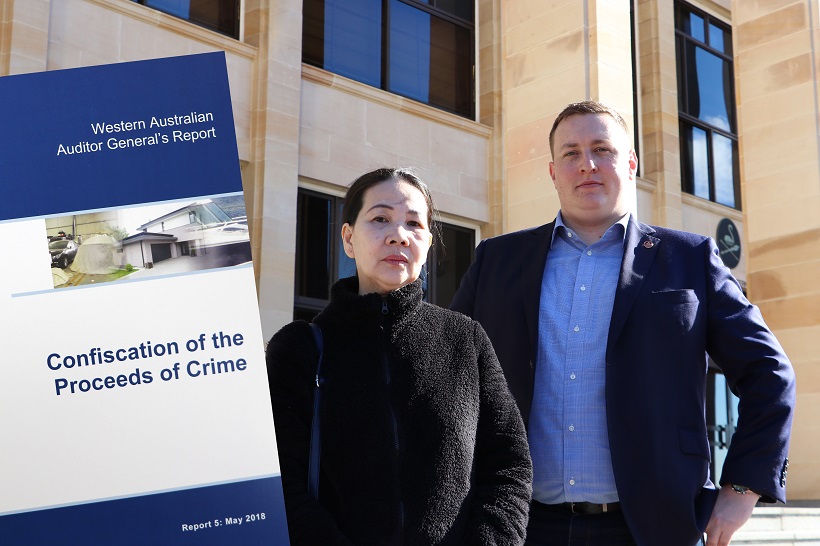People regularly talk about things being “as safe as houses” and the great Australian dream of owning your own home is now a reality for more and more people, but how safe are law abiding citizens when it comes to government confiscation laws?
If you think the suite of confiscation laws brought in under recent governments, Labour and Liberal alike, are only there to tackle major criminals – the so-called king-pins of organised crime, and the ‘Mr Bigs’ of the drug trade – then perhaps it’s time for a reality check.
Take the case of Ms Nguyen, who I met earlier this month (and with whom I’m pictured above). A single mother and a factory worker earning close to the minimum wage, she is fighting to stop the DPP from selling her house out from under her.
This person has no criminal record; not so much as a parking ticket against her name.
Her estranged husband left her to bring up their daughter alone in 2010. Having moved out of the family home, he fell in with a bad crowd, and three years later he was convicted of drug offences and jailed. That’s when the DPP came knocking at the door – the door of a house they claimed they now owned half of.
Ignore the fact that this lady has been the sole mortgage payer on the property for eight years. That counts for nothing. She has to produce 50 per cent of the equity held in the property, or watch the government sell it out from under her. How do you do that overnight on a factory worker’s wage?
She has done the right thing throughout. She has kept up her payments, she has maintained the property at her own expense. Does the DPP take that into account? No, they don’t.
Now ask yourself, could you find yourself in her shoes?
If your partner, heaven forbid, walks out the door tomorrow, and three years down the track is arrested and charged, could you lose your house through no fault of your own? Well, yes, you could.
If your teenage son or daughter is, unbeknown to you, selling weed from the family home, could that home be sold without your consent? Well, yes, it could.
Is this situation right and just? Far from it. Yet my appeals to the Attorney General and to the McGowan Government to amend the law continue to fall on deaf ears. They would rather be tough on crime in theory, than display reason and compassion in practice.
Most jurisdictions across Australia have some form of confiscation legislation in place, but those in Western Australia are particularly harsh and egregious.
Recent figures released by the WA Auditor General show that it’s the average Joe who’s paying the price for confiscations, and there are a worrying number of cases of innocent parties being left homeless after the State’s Director of Public Prosecutions and WA Police come knocking.
And to be clear, they can knock on your door for a whole host of reasons, many of them outside your control.
They can claim that the property was bought with the proceeds of crime, in which case it will be up to you to prove that it wasn’t. That is perhaps the confiscation option that people have the least argument with, though it can still see your partner and kids out on the street.
They can claim that the property was used in the commission of a crime. You don’t have to have used it personally, they can still confiscate it.
Any crime that attracts a two-year sentence or more – and let’s face it, that’s most crimes on the statute book – can be used as the basis for a confiscation order.
And if drugs are involved, the DPP can and will apply for a drug-trafficker declaration in all eligible cases, regardless of the circumstances.
I know of one couple who face the loss of their home over a cannabis possession charge that attracted a twelve-month suspended sentence. That gentleman didn’t spend a single night in jail, and that’s about as far from a major drugs case as you can get, yet his legally purchased home now belongs to the state. In any other circumstance, we would call that theft.
That’s a specific case though. What about the average confiscation?
Well, the WA Auditor General’s review of confiscation cases, published earlier this month, show that the majority of confiscations fall into two categories: real estate, and vehicles. In other words, the family home, and the family car.
What is interesting though is the value of those homes and cars.
The average value of real estate confiscated in 2013-14 was just $499,000. In 2014-15 it rose slightly to $519,000. The median house price in Perth has fallen in recent months, but it currently sits at $553,000. In other words, the majority of the homes seized by the state and sold were worth less than the average house price. They weren’t McMansions. They were the homes of ordinary families.
It’s a similar picture when we look at vehicle confiscations. If you want to view high-end sports cars and luxury vehicles, you won’t find them in the state lockup. The average value of the cars seized in 2013-14 was just $24,000. Try buying a new family hatchback for $24,000 and see how much change you have left over.
And I can’t stress strongly enough the fact that you don’t personally have to be at fault to suffer under these various confiscation laws.
The Legislative Council here in WA will debate this legislation in the coming weeks, as the government attempts to extend them to give the CCC the right to confiscate, alongside the Police and the DPP. I intend to oppose that extension because I’ve seen too many innocent parties come through my office asking for help with confiscation cases in the past twelve months.
Could you be next? I certainly hope not, but someone reading this certainly could be, and I don’t envy their chances, or yours.
Aaron Stonehouse is a Liberal Democrat Member of the Western Australia parliament.
Illustration: Supplied.
Got something to add? Join the discussion and comment below.
Got something to add? Join the discussion and comment below.
Get 10 issues for just $10
Subscribe to The Spectator Australia today for the next 10 magazine issues, plus full online access, for just $10.


























Comments
Don't miss out
Join the conversation with other Spectator Australia readers. Subscribe to leave a comment.
SUBSCRIBEAlready a subscriber? Log in